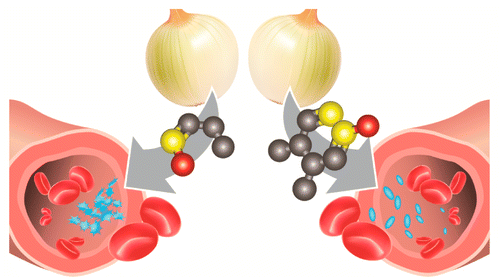'Tearless' onions could help in the fight against cardiovascular disease, weight gain

Onions, a key ingredient in recipes around the globe, come in a tearless version that scientists are now reporting could pack health benefits like its close relative, garlic, which is renowned for protecting against heart disease. They published their laboratory analysis, which suggests a similar heart-friendly role for the tearless onions, as well as a possible role in managing weight gain, in ACS' Journal of Agricultural and Food Chemistry.
Colin C. Eady and colleagues note that the onion has a unique chemistry that leads to its tear-inducing effects when cut. Its pungency has driven cooks to don goggles, clench wooden spoons in their mouths and try other usually futile techniques to prevent crying at the cutting board. An answer could arrive in the form of a new type of onion that makes less of the protein blamed for making eyes burn and tear up. Eady's team has developed such a version, which instead makes a sulfur compound similar to one found in cut garlic that may be the key to its cardiovascular benefits. Many people eat garlic cloves or take it as a nutritional supplement in pill form to reduce the clumping of platelets in the blood, which can lead to blood clots and clogged arteries. Garlic also has been shown to reduce weight gain. They wanted to know whether the new onion might also have similar positive effects on health.
The scientists found that in lab tests, extract from the tearless onion significantly reduced platelet clumping, compared to regular onions or even garlic. Other results showed that the new onion had about the same anti-inflammatory properties as the original. Also, preliminary testing in rats showed that the tearless onion could help control weight gain—more so than regular onions or garlic.
More information: "Inhibition of Platelet Activation by Lachrymatory Factor Synthase (LFS)-Silenced (Tearless) Onion Juice" J. Agric. Food Chem., 2013, 61 (44), pp 10574–10581. DOI: 10.1021/jf4030213
Abstract
Onion and garlic are renowned for their roles as functional foods. The health benefits of garlic are attributed to di-2-propenyl thiosulfinate (allicin), a sulfur compound found in disrupted garlic but not found in disrupted onion. Recently, onions have been grown with repressed lachrymatory factor synthase (LFS) activity, which causes these onions to produce increased amounts of di-1-propenyl thiosulfinate, an isomer of allicin. This investigation into the key health attributes of LFS-silenced (tearless) onions demonstrates that they have some attributes more similar to garlic and that this is likely due to the production of novel thiosulfinate or metabolites. The key finding was that collagen-induced in vitro platelet aggregation was significantly reduced by tearless onion extract over normal onion extract. Thiosulfinate or derived compounds were shown not to be responsible for the observed changes in the inflammatory response of AGS (stomach adenocarcinoma) cells to tumor necrosis factor alpha (TNFα) when pretreated with model onion juices. A preliminary rat feeding trial indicated that the tearless onions may also play a key role in reducing weight gain.
Journal information: Journal of Agricultural and Food Chemistry
Provided by American Chemical Society


















